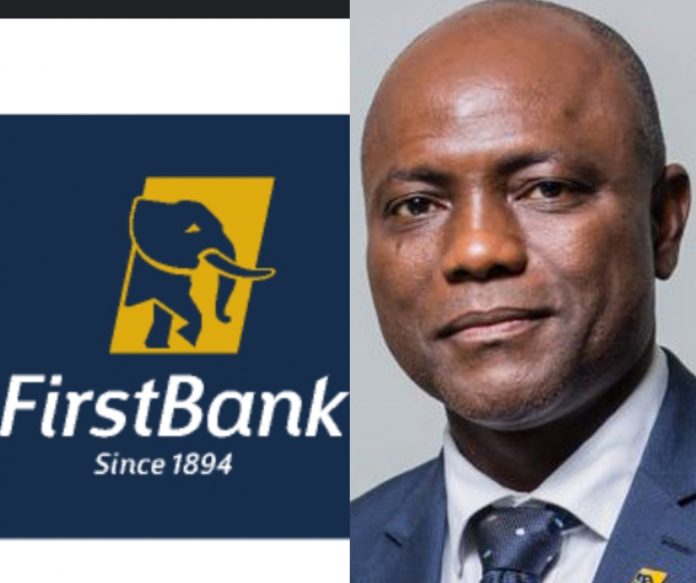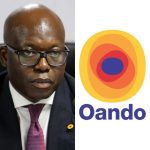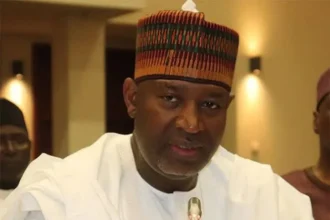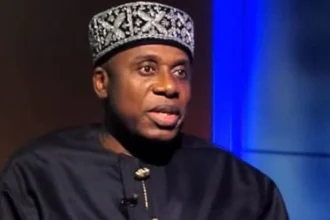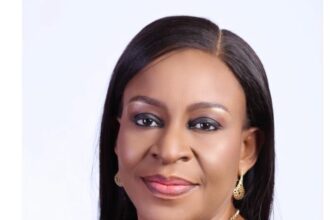...To get all news updates, Join our WhatsApp Group (Click Here)
Also Join our WhatsApp Channel (Click Here)
If the long drawn legal tussles with some shareholders are not quickly resolved, First Bank may for the second straight year find the annual meeting of shareholders of First Holdings, the parent company of Nigeria’s oldest bank under threat.
Society Reporters had reported how a Lagos Federal High Court issued an order stopping FBN Holdings’ 12th AGM, originally slated initially for August 22, at the behest of shareholder Tohir Folorunsho Ismaila. Ismaila’s action is the latest in the growing list of shareholders blocking the bank’s crucial annual meeting.
The virtual meeting according to a notice by the bank on NGX has now been shifted to September 3. The bank was supposed to get shareholders approval for a N350 billion capital raise in the form of a public offering, rights issue or private placement.
Recall that the bank had in April disclosed strategies to raise some N300 billion via issuance of shares, public offering, private placement or rights issue in the Nigerian or international capital markets. Currently Nigerian banks are enmeshed in an aggressive scramble for cash to meet new capital base benchmark set by the Central Bank.
Some banks have nearly scaled the hurdles and close to goal post . Banks like GTCO and Fidelity have wrapped up their capital raising strategies, while big lenders from Zenith to Access are almost reaching the finish line.
The legal fireworks are threatening to put a spanner in the work of First Bank’s bid to get approval for its capital raise as the postponement of its AGM means another delay.
The postponement of the AGM is as a result of a recent High Court ruling stopping the meeting.
Recall that last year the bank’s annual general meeting was anchored on a quick sands following a similar court ruling by Justice I. N. Oweibo in the case brought against the bank by three shareholders – Olojede Adewole Solomon, Adebayo Oluwafemi Abayomi and Ogundiran Emmanuel Adejare, stopping the meeting from holding.
In the end last year virtual meeting did hold with First Bank saying it was not served any court order stopping it from holding its 11th Annual General Meeting.
At the heart of the legal fireworks was shareholders’ questioning of the legitimacy of a Board appointed by the CBN rather than shareholders.
The delayed AGM was actually now scheduled for September 3 was supposed to approve a fixed amount of N50 million each as directors’ fees for the financial year ending 31 December 2024 and N63.7 million as the fee for the board chairman.
Femi Otedola, secured approval as chairman at the AGM last year.
Series of court documents showed that First Bank’s protracted legal battles started when some of its disaffected shareholders cast a shadow on its AGMs.
Shareholders including Olusegun Samuel Onagoruwa, Kujenya Olayiwola Yusuf and Hakeem Lawal-Oluwa, had earlier began lawsuits calling in question the legitimacy of the AGMs, citing infractions of court orders that prohibited such meetings.
It would be recalled that a motley of cases are in various stages of court proceedings, with some adjourned pending appeals while others are awaiting judgement.
Olusegun Samuel Onagoruwa vs. FBN Holdings (FBHN) – In the simmering feud between Olusegun Samuel Onagoruwa, an accountant and shareholder, and FBN Holdings, the battle lines were drawn long before the ink could dry on the 10th Annual General Meeting (AGM) notice. Onagoruwa, the driving force behind his firm, Segun Onagoruwa & Co., has been fighting since 2022 to stop the AGM in its tracks. With a court order in his kits suspending all AGM-related actions,Onagoruwa and his legal team have been more than steadfast in resisting FBNH’s unwavering efforts to lift this judicial blockade.
Despite the court’s objection, FBNH convened the AGM in 2023, giving rise to contempt proceedings over its directors. The debacle twisted in 2024 when Leadway Assurance joined the fray, praying the court to break the deadlock.
But Onagoruwa’s camp countered the manoeuvre, as they filed objections that further knotted the entanglement of the proceedings.
The case initiated by Onagoruwa has found itself in a hazy labyrinth of crossroads, as it paused in anticipation of the appellate court’s verdict, while the Leadway case is set to resume on October 15, 2024.
Leadway Holdings Ltd vs. FBN Holdings Plc & Others – A Battle for Compliance
In another corner of the legal battlefield, Leadway Holdings Ltd took its grievances to the Federal High Court in Lagos, demanding that FBN Holdings Plc be compelled to hold its AGM. The catalyst for this dispute is a newly minted directive from the CBN which increases the minimum capital requirements for banks. Leadway argues that this AGM is not just a procedural formality but a necessity to align with the Central Bank’s mandate, effective from March 28, 2024.
The plot thickens as Hakeem Lawal-Oluwa, an unexpected defendant in the matter, raises a red flag. He contends that Leadway’s lawsuit is redundant, given the existence of similar cases already clogging the courts. The case, initiated on April 30, 2024, has seen a flurry of legal skirmishes. Lawal-Oluwa’s objections and counterclaims have been met with staunch rebuttals from Leadway, all culminating in a tense courtroom session on May 23, 2024.
Kujenya Olayiwola Yusuf vs. FBN Holdings Plc Kujenya Olayiwola Yusuf, a minority shareholder in FBN Holdings Plc, finds himself pitted against First bank in a battle over the legitimacy of last year’s AGM. The meeting, scheduled for August 15, 2023, promised to discuss crucial resolutions, including a significant increase in the company’s share capital. But as the date approached, Yusuf learned of a Federal High Court order that had thrown a wrench into the works, prohibiting FBN Holdings from holding the AGM.
Undeterred by the court’s directive, the company pressed ahead, passing the resolutions and updating its records with the Corporate Affairs Commission (CAC)—actions that Yusuf argues were not just illegal but a direct affront to his rights as a shareholder.
His lawsuit aims to nullify all decisions made during the AGM, including the registration of the new share capital and the revised Memorandum and Articles of Association. The case, with the CAC also in the dock for its role in registering the contested documents, remains unresolved, with the next court date set for October 3, 2024.
Yetunde Olowoyeye vs. Securities and Exchange Commission
A Minority Shareholder’s Stand In yet another twist, Yetunde Olowoyeye, a minority shareholder, has taken on the might of FBN Holdings Plc, the Securities and Exchange Commission (SEC), and the Corporate Affairs Commission (CAC) in a bid to uphold the rule of law. Her case, filed under Suit No. FHC/ABJ/CS/1613/2023, also revolves around the controversial AGM of August 15, 2023, which Olowoyeye claims was held in blatant defiance of a court order issued just days earlier on August 9.
The resolutions passed during this AGM, Olowoyeye argues, are null and void, having been forged in the fires of judicial contempt. Her lawsuit seeks to block the implementation of these resolutions, asserting that they violate shareholder rights under the Companies and Allied Matters Act (CAMA) 2020. FBN Holdings Plc, in its defense, questions the court’s jurisdiction and the plaintiff’s standing, branding the lawsuit an abuse of process given that similar issues are already under appeal.
Hakeem Lawal-Oluwa vs. Securities and Exchange Commission & 3 Others Hakeem Lawal-Oluwa is also challenging the legitimacy of last year’s AGM in court. He argues, like the others, that the AGM was convened in direct contravention of a court order from August 9, 2023, which had temporarily blocked the meeting.
The defendants in this case—the Securities and Exchange Commission (SEC), FBN Holdings Plc, and two other related entities—find themselves accused of flouting judicial authority. Lawal-Oluwa seeks court orders to halt any actions that might undermine his interests or sidestep the previous court ruling. But the case, like so many others in this legal labyrinth, has been put on ice, pending the outcome of related appeals.
Lawal-Oluwa in a separate suit against the Securities and Exchange Commission (SEC), Nigerian Exchange Group PLC, and the Attorney General of the Federation, argued that the illegal AGM not only violated proper procedures but also jeopardised his rights as a shareholder by increasing share capital and waiving shareholders’ pre-emptive rights.
FBN Holdings’ Appeal Against Olojede Adewole Solomon and Others – A Fight to Overturn an Injunction
In a parallel legal skirmish, FBN Holdings PLC is battling to overturn the initial injunction that has cast a long shadow over its Annual General Meeting (AGM) last year. The injunction, granted on August 9, 2023, at the behest of Olojede Adewole Solomon, Adebayo Oluwafemi Abayomi, and Ogundiran Emmanuel Adejare, has become the focal point of FBN Holdings’ legal strategy.
The company argues that the trial judge erred in granting the injunction while similar relief was still pending in the substantive suit. FBN Holdings contends that the court lacked the jurisdiction to issue the order, citing procedural deficiencies. Furthermore, the company asserts that an AGM, as a statutory requirement under Nigerian law, cannot be restrained by an injunction.
Undeterred, FBN Holdings has appealed to the Court of Appeal, seeking not only to overturn the injunction but also to stay further proceedings in the case. The company argues that the injunction was born out of self-induced urgency rather than genuine necessity, and that the lower court’s decision was fundamentally flawed.
M.A. Banire & Associates vs. FBN Holdings PLC – A Call to Accountability
As the legal drama surrounding FBN Holdings reaches its crescendo, M.A. Banire & Associates, representing the petitioners Olojede Adewole Solomon and others, have issued a clarion call for accountability. The law firm has expressed grave concerns over FBN Holdings’ blatant disregard for the Federal High Court’s interim order of August 9, 2023, which prohibited the company from holding its AGM on August 15, 2023.
Despite the court’s clear directive, FBN Holdings proceeded with the meeting, approving a contentious increase in its share capital. The petitioners, through their solicitors, have urged the Corporate Affairs Commission (CAC) to retract the registration of the AGM’s resolutions, warning that failure to act in accordance with the law will prompt further legal action. The letter from M.A. Banire & Associates, signed by Muiz Banire, underscores the seriousness of the situation and the petitioners’ determination to see justice served, even if it means escalating the matter to higher judicial authorities.
Efforts made by us to obtain a reaction from Chinwe Bode Akinwade of First Bank Corporate Communicatio ns department over the developments were fruitless, as she was yet to respond to questions sent to her phone, and her number was unreachable for calls.
You can get every of our news as soon as they drop on WhatsApp ...To get all news updates, Join our WhatsApp Group (Click Here)
Also Join our WhatsApp Channel (Click Here)



